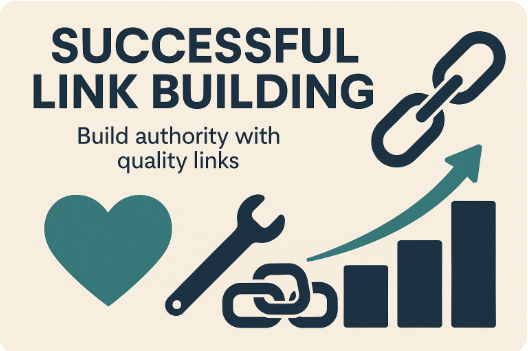Creating a successful link-building campaign is essential for businesses and content creators aiming to improve their online visibility. In today’s competitive digital landscape, backlinks remain a cornerstone of search engine optimization (SEO), providing websites with the authority and trust they need to rank higher in search results. However, not all link-building strategies are created equal. This opinion piece explores the steps, strategies, and ethical considerations necessary to develop a link-building campaign that delivers sustainable results.
Understanding the Basics of Link-Building
Before diving into strategies, it’s important to understand what link-building is and why it matters. Link-building is the process of acquiring hyperlinks from other websites to your own. These links act as endorsements, signaling to search engines like Google that your content is valuable and trustworthy. When executed correctly, link-building can drive organic traffic, enhance brand authority, and improve search engine rankings.
However, link-building is not just about quantity; quality reigns supreme. A few high-quality, relevant backlinks are far more valuable than dozens of low-quality links. Google’s algorithms have evolved to reward websites with natural, ethical, and authoritative links while penalizing manipulative practices.
Step 1: Define Your Objectives
Every successful link-building campaign starts with clear goals. Are you trying to increase traffic, improve domain authority, rank for specific keywords, or build relationships within your industry? Understanding your objectives helps tailor your strategy and measure success effectively. For instance, if your goal is to rank higher for a competitive keyword, you’ll focus on earning links from authoritative sites within that niche.
Step 2: Research Your Audience and Competitors
Knowing your audience is crucial for crafting content that attracts links. What topics interest them? What problems are they trying to solve? By answering these questions, you can create content that naturally earns backlinks.
Competitor analysis is equally important. Tools like Ahrefs, SEMrush, and Moz can reveal your competitors’ backlink profiles, giving you insights into their strategies. Identify which sites link to them, the type of content they link to, and the methods they use. This information provides a roadmap for your campaign, helping you replicate successful tactics and avoid pitfalls.
Step 3: Create Link-Worthy Content
Content is the backbone of any link-building campaign. Without valuable, engaging content, convincing other websites to link to you becomes a herculean task. Here are some types of content that tend to attract backlinks:
- Research and Data-Driven Articles: Original studies, surveys, and reports are goldmines for backlinks. People love linking to authoritative data.
- How-To Guides: Comprehensive guides that solve specific problems are highly linkable.
- Infographics: Visually appealing and easy to share, infographics are effective in earning links.
- Lists and Rankings: “Top 10” or “Best of” lists often attract attention and backlinks.
- Case Studies: Detailed case studies showcasing real-world results can attract links from industry professionals.
Make sure your content is well-researched, visually appealing, and optimized for SEO. High-quality content not only attracts links but also retains visitors, increasing your site’s overall value.
Step 4: Outreach and Relationship Building
Outreach is the heart of link-building. It involves contacting other website owners, bloggers, and influencers to request a link. However, successful outreach requires a personalized, strategic approach. Here’s how to do it effectively:
- Personalize Your Outreach: Generic emails are often ignored. Address recipients by name, reference their work, and explain why linking to your content benefits them.
- Build Relationships: Instead of asking for a link outright, focus on building relationships. Engage with their content, share their work, and comment on their posts before making your pitch.
- Offer Value: Highlight how your content complements theirs. For instance, if you’ve written an article that expands on their topic, they’re more likely to link to it.
- Follow Up: Many emails get lost in crowded inboxes. A polite follow-up can increase your chances of getting a response.
Step 5: Leverage Guest Blogging
Guest blogging is a tried-and-true method for earning high-quality backlinks. By contributing valuable content to reputable websites in your niche, you gain exposure and build authority. To maximize success:
- Choose sites with a strong domain authority and an engaged audience.
- Pitch unique, relevant topics that align with their content.
- Include a natural, contextual backlink to your site in the content or author bio.
Avoid low-quality guest blogging practices, such as submitting to link farms or unrelated sites, as these can harm your SEO efforts.
Step 6: Utilize Broken Link-Building
Broken link-building involves finding broken links on other websites and offering your content as a replacement. This tactic provides value to site owners by helping them fix issues while earning you a backlink. Tools like Check My Links or Broken Link Checker can streamline this process.
When approaching site owners, be polite and concise. Inform them about the broken link, suggest your content as a replacement, and thank them for their time.
Step 7: Monitor and Analyze Your Campaign
Tracking your campaign’s performance is essential for refining your strategy. Tools like Google Analytics, Ahrefs, and SEMrush can help you:
- Monitor new backlinks.
- Assess referral traffic.
- Evaluate keyword rankings.
- Identify top-performing content.
Analyze what’s working and adjust your approach accordingly. Continuous improvement is key to long-term success.
Ethical Considerations in Link-Building
Ethics play a critical role in link-building. Black hat tactics, such as buying links, participating in link schemes, or using automated tools, can lead to severe penalties from search engines. Always prioritize quality over quantity and focus on building genuine, long-term relationships.
Additionally, be transparent in your outreach. Misleading website owners or disguising your intentions can damage your reputation and credibility. A successful link-building campaign is built on trust, mutual benefit, and ethical practices.
Common Pitfalls to Avoid
Even with the best intentions, link-building campaigns can falter. Here are some common mistakes to steer clear of:
- Ignoring Relevance: Links from irrelevant sites offer little value and can harm your SEO.
- Overlooking Anchor Text: Using generic anchor text like “click here” misses an opportunity to optimize for keywords.
- Focusing Solely on Quantity: A high number of low-quality links is less effective than a few high-quality ones.
- Neglecting Relationships: Link-building isn’t a one-time transaction. Building relationships ensures future opportunities.
- Being Impatient: Link-building is a long-term strategy. Avoid shortcuts and give your campaign time to yield results.
The Future of Link-Building
As search engine algorithms become more sophisticated, the focus of link-building is shifting towards creating authentic, valuable connections. Strategies like digital PR, influencer collaborations, and community engagement are gaining prominence. AI tools are also playing a role in streamlining outreach and identifying opportunities, but human creativity and authenticity remain irreplaceable.
In closing:
Creating a successful link-building campaign requires a combination of strategy, creativity, and persistence. By setting clear objectives, crafting link-worthy content, building genuine relationships, and adhering to ethical practices, you can improve your website’s visibility and authority. Remember, link-building is not a one-size-fits-all approach; it’s an evolving process that demands continuous learning and adaptation. When done right, it’s a powerful tool that can propel your online presence to new heights.
Frequently Asked Questions (FAQ):
Q: What is a link‑building campaign?
A: A planned set of activities to earn relevant backlinks to your site using tactics like digital PR, guest posts, unlinked‑mention turnarounds, partnerships and resource placements—aimed at lifting authority, rankings and qualified traffic.
Q: How do I plan a successful link‑building campaign?
A: Define goals and pages to promote, research competitors’ links, build a quality prospect list, create link‑worthy assets, run respectful outreach, and track links and outcomes. Start small, test, then scale what works.
Q: Which link‑building tactics work best in Australia/NZ?
A: Relevance‑first tactics: newsworthy content/digital PR, quality guest contributions, local sponsorships and associations, resource pages, and accurate local citations. Avoid spammy directories and PBNs.
Q: How many links do I need and how fast should I build them?
A: Benchmark against top competitors and your current authority. Aim for consistent, natural acquisition—quality over quantity—rather than a fixed monthly quota.
Q: How long until I see results?
A: Often 2–4 months to see early movement, longer in competitive niches. Results depend on link quality, on‑page optimisation and keyword competitiveness.
Q: How do I judge if a site is a good link prospect?
A: Prioritise topical relevance, real organic traffic, editorial standards and a clean backlink profile. Use DR/DA as directional only—relevance and traffic matter more.
Q; Is buying links or using PBNs safe?
A: No—paid links and PBNs breach Google’s spam policies and carry real risk. Invest in earning links through useful content and genuine relationships instead.
Q: How should I measure success?
A: Track acquired links and referring domains, target‑page rankings, and organic traffic/conversions. Use UTM tags and notes so you can tie links to outcomes.



